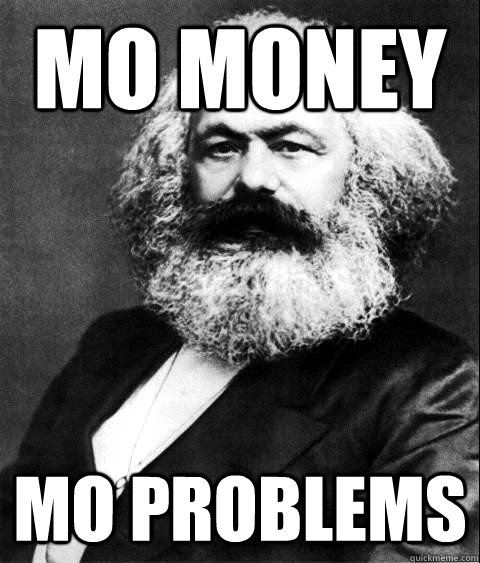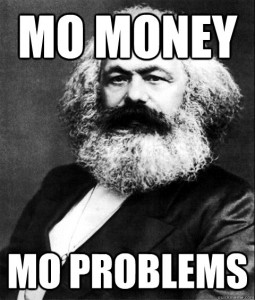On Sunday I stumbled upon this recent New York Times column The Fall of France by Paul Krugman. Then I caught BBC’s Newsnight interview with France’s ‘Socialist’ Prime Minister Manuel Valls.
Krugman notes that the Socialists came to power on an anti-austerity mandate, but completely squandered their opportunity to lead France on a new path, and lead the Eurozone out of the huge hole that it has dug for itself and that it is now digging for the rest of the world. Sadly “Once in office, [President] Mr. Hollande promptly folded, giving in completely to demands for even more austerity … the intellectual justification [in 2012] for these policies was weak and would subsequently collapse“.
In New Zealand our equivalent party Labour actually campaigned on a similar austerity programme, and the man who masterminded that programme now seeks to be Labour Party leader. Fortunately New Zealand has its own currency, so there is an alternative outcome to that of Greece if a future New Zealand government imposes Euro-style deflation onto us.
Krugman goes on to note:
Europe, as a whole, is in deep trouble. However, within that overall pattern of disaster, France’s performance is much better than you would guess from news reports. France isn’t Greece; it isn’t even Italy. But it is letting itself be bullied as if it were a basket case.
Europe has incorrectly self-diagnosed its problems, making its actual problems even worse as a result. It sees it overall problem as a ‘sovereign debt crisis’, and has prescribed that all Eurozone countries should achieve a government budget deficit to GDP ratio of three percent. [One outcome of this target is the huge spending cuts that have taken place in the Spanish public health system; you cannot deal with threats like ebola while sticking to these arbitrary and pointless accounting targets.]
And within that incorrect self-diagnosis, it has identified the problems of half its members as a lack of ‘competitiveness’. Now, when we hear politicians or their advisers repeatedly use the words ‘competitive’ or ”competitiveness’ in interviews or speeches, then it’s time to get very worried.
As Krugman himself has noted on a number of occasions, the concept of ‘competitiveness’ is simply very bad economics. [Good economics uses the word ‘productivity’, though this word is also used provocatively by some right-wing commentators.]
‘Competitiveness’ is a relativist sporting metaphor; its use should be reserved for sporting contests. In economics, ‘competitiveness’ reflects a world-view in which many or most people [or workers or nations] must be classed as ‘losers’. Policies waged in the name of ‘competitiveness’ are invariably ‘races to the bottom’. You win by inflicting more pain on other contestants than you inflict upon yourself.
On France seeking a quick route to the bottom, Krugman says:
He [Hollande] has fallen into a vicious circle in which austerity policies cause growth to stall, and this stalled growth is taken as evidence that France needs even more austerity.
Greece has followed the standard austerity prescription. Its GDP per capita has fallen 23 percent since 2007, and is about 40% below what it would need to be to return to something like full employment. In that time Greece’s government debt to GDP ratio has increased from 105% to 175%; not good when the whole point of the policy was to get that ratio down.
Greece’s economy is more ‘competitive’ than it was. Key indicators are its inflation rate and its falling imports. Greece has now had deflation for nearly two years. Eurocrats in Brussels and Berlin are telling Greece that low deflation rates will enable Greece to export to countries like Germany and Belgium. Likewise France’s strategy is to increase its exports to Germany and Belgium by suppressing costs, meaning paying lower wages and raising working hours. (Germany and Belgium, economic competitors of France and Greece, are of course also trying to increase their net exports.) The result of public sector austerity (‘consolidation’ is the euphemism) in Greece is, instead, an official unemployment rate of 27.3%, up from 7.7% in 2008 and from 24% in 2012. While France at 10.5% unemployed – 24% youth unemployment – still has a long way to go to match Greece’s achievement, it seems to be following precisely the same prescription concocted in Brussels.
Note that the concept of ‘competitiveness’ is absolutely central to David Parker’s political and economic philosophy. Parker will happily ditch raising the age of entitlement for New Zealand Superannuation, and will happily ditch the capital gains tax. But he will not ditch his commitment to competitiveness, and he will not ditch his commitment to a balanced budget.
Manuel Valls
The French Prime Minister, recently in London, was very defensive about the state of his country’s economy, and his government’s economic management. He said;
France [while far from being the “sick man of Europe”] must reform itself which is what we have been doing for the last six months by reducing public spending … our problem is the competitiveness of our businesses; in ten years we’ve lost considerable margins compared to Germany; we are implementing a plan that involves reducing by forty billion Euros the contributions, labour costs and taxes on businesses; taxes have risen too much … most shops aren’t open on Sundays …
His basic plan is to try to coax businesses into investing more so as to be a more competitive exporter, while at the same time substantially reducing domestic aggregate demand, which means reducing public sector investment. This is not a plan for growth; it doesn’t work and it cannot work. Essentially it’s a plan of corporate welfare; tax concessions, and getting workers to work longer hours and to accept minimal pay increases. The Budget is to be balanced despite substantially less revenue.
Brussels, though, apparently doesn’t think the French are committed enough to deficit reduction. The Eurocrats expect a compliant France to do the impossible, and then expect them to do more of the impossible when they fail to achieve that unachievable task. Valls says “we’ll see about that”; he’s up to the challenge set by Eurocrat central.
We have too high a deficit, why? Not because of public expenditure but because growth in France is too low and inflation [virtually deflation, +0.4%] is too low to bring the deficit down. We need to prioritise growth. … We must invest for the future [?!]
To restore the level of ‘competitiveness’ France enjoyed vis-à-vis Germany in the mid-2000s, France requires substantial deflation. Indeed, that’s what cutting costs is all about; achieving that deflation, just as Greece, Spain, Portugal and Italy have done.
Yet Valls blames near-deflation for France’s failure to reach its debt reduction targets. He simultaneously wants deflation to create competitiveness, and inflation to help boost nominal GDP and therefore improve his country’s deficit and debt ratios. The meek everywhere must arise and embrace alternatives to such intellectual bankruptcy.
We in New Zealand should also note that when countries pursue this austere pastiche of socialism, then parties like UKIP arise, as is happening in the UK and, in more extreme form, in many European countries. Beware.







John Maynard Keynes must be rolling in his grave.
Indeed 🙁
Krugman, believes in ‘infinite resources in a finite world’, check out his remarks about ‘how peak oil is wrong’.
He thus IMHO has very limited credibility, and some serious conflicts of interest (that aren’t in the open).
The trouble for your analysis is the the French have not started to look at cutting government spending or the size of the state until quite recently. They have adopted policies in the recent past which I suspect you would approve of yet the country has not performed better than those such as the UK or Germany who follow more right leaning ones.
Guess you better tell that to the growing number of South American country’s who have adopted socialism and are now doing fine thank you very much after getting rid of neo liberalism.
You mean like Venezuela?
http://www.theguardian.com/world/2014/sep/09/venezuela-maduro-labour-dispute-ciudad-guayana
Yeah doing real well there.
The UK is a complete basket case – except for those morally bankrupt few at the top of the tree. Germany is still sustainable because, basically, it controls the banks and hence dictates terms to the rest of the morally and intelligently bankrupt European leaders.
The UK and German economies are doing far better than most of the rest on the European mainland.
Not really – the UK economy may be recovering better than some in the EU but it is still middle of the pack compared to Denmark, Sweden, Norway, Germany, Netherlands – and even some of Central/Eastern Europe is showing some stronger growth signs.
http://www.economist.com/blogs/graphicdetail/2014/08/european-economy-guide
The data in that link supports the position that the UK as well as Germany are doing better than most other European countries.
Interestingly the other nations doing well also have low government deficits and also low sovereign debt which is at odds with the approach promoted by the author of this blog post.
… as opposed to the $70 billion-odd debt which National has racked up in the last six years?!
Yes, National has not been following austerity over the past 6 years
And you avoided the point I made. As per.
Your point being what exactly?
Excellent column, Keith. You’re becoming a must read for me.
Thanks.
Great to see someone challenging the status quo economic discourses.
Comments are closed.